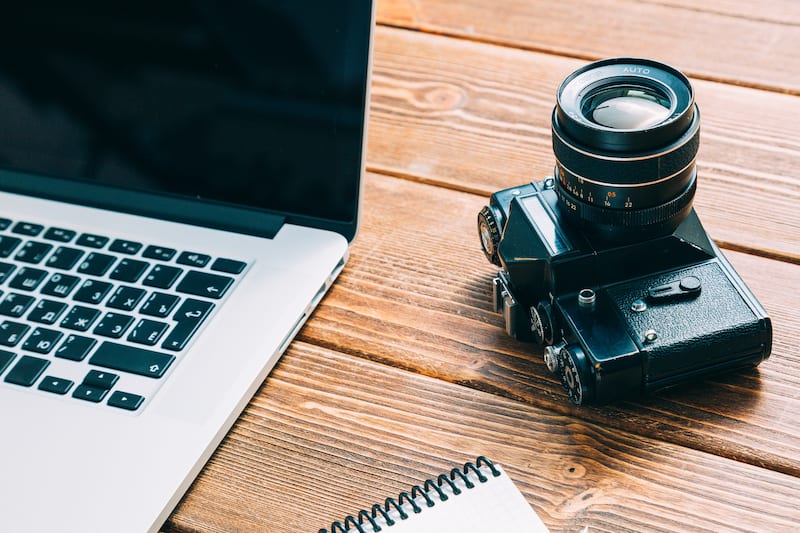Images are important for your online content. There are countless pictures available online for your consumption, but you need to make sure you are legally using them. It can be easy and tempting to simply copy and paste the perfect image from the Internet. However, this is something you cannot do without considering the image copyrighting. You need to make sure you are using legal stock images. But a subscription to a stock photography website can be expensive. Luckily, it is possible to find public domain images. For example, there are great stock photography websites out there for small businesses.
When you use photos you found online, there are certain ways to ensure you are legally doing so. This article will explain is your complete guide to how to find copyright-free images online like public domain images, how to follow copyright image licenses, creative commons licensed images, stock images, and more. If you are asking “Can I use Google images for my website?” you are in the right place.
Table of Contents
Consequences of Violating Copyright Laws
It is important to know how to legally obtain online images because the consequences of violating copyright laws are serious, even if it was on accident. It can even result in legal action. Those who are found guilty of copyright violation can faces charges up to $150,000. It is important to make sure you are using online images that are free to use.
Legal Online Photo Sources
1 – Public Domain Images
Public domain images are photos with no image copyright. These pictures do not have copyrights for multiple reasons. It can be that the image copyright has expired or the work was never copyrighted. Other reasons can be that the copyright holder released the work into the public domain. Lastly, US works published before January 1, 1924 images do not have copyrights.
You can tell if online images are copyright-free in two ways. They will have the Public Domain 1.0 or the CC0 1.0 Universal Public Domain Mark. Public domain images do not require any citation. This is the only way to use pictures from the Internet without permission. Since there is no copyright, permission is not required.
There are sites that specifically contain public domain images. Sites like Wikimedia Commons, Unsplash, Flickr Commons, Public Domain Pictures, Magdeleline, and more provide public domain images.
2 – Use Creative Commons Images
Creative Commons licensed images are a great source of free photos. Creative Commons (CCC)provides a standardized way to grant image copyright persimmon to their creative work. It is a widely used tool to copyright creative works. Users range from individual creators to large companies. They can retain copyright while allowing others to copy, distribute, and make use of their creative works, non-commercially.
To receive an image copyright license, the creators, who are called licensors, need to answer a few questions. It is a relatively simple process. The licensors still have some control over how their creative works are used in this situation. They can decide if they want their work to be used for commercial use or not. Commercial use can be defined as use that is “primarily intended for commercial advantage or monetary compensation.” The compensation can be both direct or indirect. For example, a picture on a blog post or website that is affiliated with a for-profit company is commercial use. Therefore, if you are looking for pictures to use for your website, make sure you use ones available for commercial use.
Licensors also have to decide if they want to allow derivative works. There are certain stipulations regarding this. Attribution is when the license allows others to distribute, remix, edit, and build up the creator’s work as long as the licensor receives credit for the original work. The attribution share-alike is the same as attribution with an added stipulation. It is when others can distribute, remix, edit, and build up the creator’s work as long they credit the licensor and license their new work under the same terms. Lastly, there is the attribution share-alike no derivatives. This license only allows for the redistribution of an image when there are no changes and the licensor is created.
When you are using CCSearch, you can filter the images to include only ones that can be used commercially. You can also set filters for images that are allowed to be modified or adapted.

3 – Use Stock Photos
Stock photos are images that creators license out to anyone who will pay their licensing fee. When you buy the license to an image, you are given the right to use that photo in any way described by the licensing agreement. The licenses vary on how you are allowed to use the picture. For example, some stock photos are only allowed to be used for editorial use. Make sure you read the licensing agreement carefully to ensure it can be used for your desired use. There are many different stock image websites.
The cost of stock photos varies. The cost depends on the type of license and what agency is selling the photo. There is a royalty-free license that is a more flexible license and it is pre-set for all images. The price of photos with this license generally ranges from $1 to $15 per image. Some stock agencies offer stock photo subscriptions. These are periodic plans that provide you access to a larger number of pictures per time period in exchange for a certain fee. If you are constantly needing stock photos, this may be something you want to look into. Stock photo sites offer subscriptions offer you a way to save money. They can reduce the price of stock photos, sometimes making an image price drop as low as $0.30 per photo.
A major advantage of stock photos is the wide variety available. There are photos for almost every niche. Stock photos are great for blogs. Professional photographers take these photos. Therefore, they are often high-quality images. The photographers know that these images will most likely be used for commercial use, so they keep that in mind when creating them.
4 – Use Social Media Images with Permission
When using social media, it is very important to give credit to others if you use their images. The same goes for using peoples’ photoss from social media. You can use social media images only with the user or creator’s permission. Just because these photos are on social media does not mean the rules change. On Instagram, the terms of service state that the image copyright of any Instagram picture belongs to the original poster.
You can avoid image copyright with these photos by asking the user or creator before you use the image. Once you receive it, then you can use it. Social media makes it very simple to ask the user. For example, you can leave a comment on the post or direct message them.

5 – Use Your Own Photos
One sure way to ensure you are legally using images is to use your own images. If you are the photographer, there are no longer any copyright concerns. An additional benefit of using your own pictures is the content is original. This is an issue one can run into with stock photos. Sometimes stock images are too generic. Using our own images online saves you from copyright infringement, since you are the image creator.
One of the most helpful social media content creation tips is to make sure the picture is perfect. You can ensure this by taking the image yourself. You don’t need to be a professional photographer! Taking your own photos is much easier nowadays with high-quality phone cameras. Technology companies like Apple are constantly updating their camera technology to provide you the ability to take the best pictures possible.
Can I Use Google Images For My Website?
The Google search engine is a great resource for finding the perfect picture. Still, before you can copy and paste that photo, you need to consider copyright law. Google is not a certified collection of public domain or copyright-free works. This means you need to do a Google Images copyright analysis before you can get a photo.
When legally using Google Images, you should assume that all photos are protected by Google copyright. You will need to do research on the image to find this information. You need to make the necessary effort and steps to determine if the picture is actually under copyright protection.
The next step depends on what information you find. If you find that it is protected by a copyright and there is no license attached, you need to receive permission before using that picture. Another possible scenario is that you find that it is protected by copyright and the owner’s name is on the photo with a link to contact them to ask for permission.
If there is a Creative Commons license attached to the image, you need to read it. As previously mentioned, there are different types of CC licenses with different stipulations. Read the CC license to see how the photo can be used. Can it be edited? Do you need to license the new version of the creative work? These questions and similar ones regarding the image use can be found in the CC license.
Google offers a tool that allows you to filter your search depending on copyright and usage features. Once you are on Google Images, click on the “Tools” button. This will add more filters to the top of your search. Click on the “Usage Rights” filter. This filter allows you to search for Creative Commons licenses or Commercial and other licenses. This tool makes it much easier to find the copyright information.

Start Legally Using Images You Find Online
Use this information to start legally using photos that you found online. You can use public domain images to avoid any image copyright issues. You can also use creative commons pictures and stock photos. Pictures you find on social media are an option if you have received permission to use them. Lastly, you can use Google photos for your website, but you will need to do research on the image copyright first.
FAQ:
- How can I legally use pictures I find online?
- Can I use Google Images for my website?
- Where can I find public domain photos?
- Can you use pictures from the Internet without permission?
- What is a Creative Commons (CC) license?



Contact Us Today!